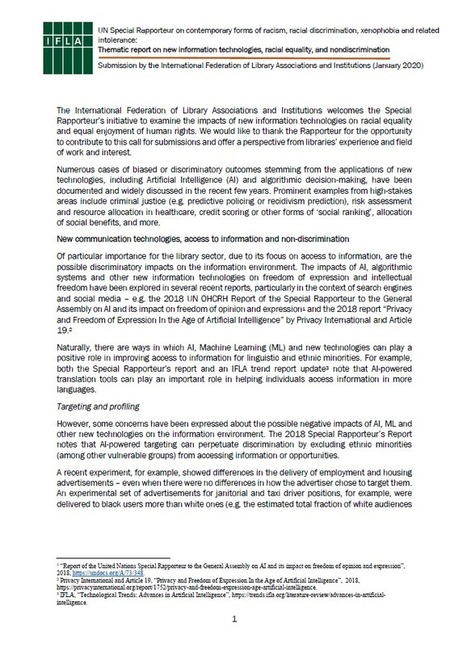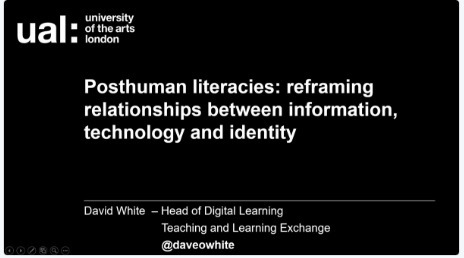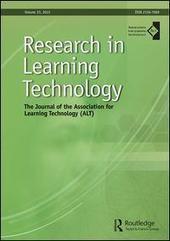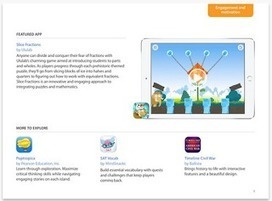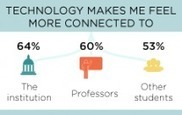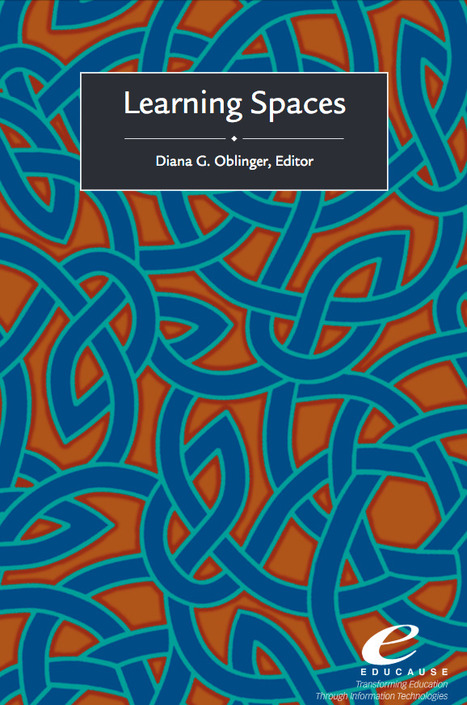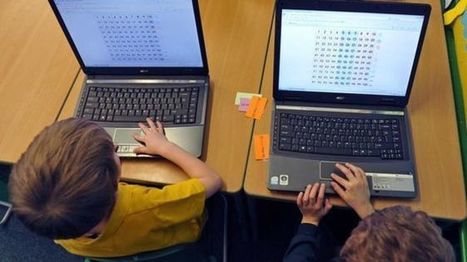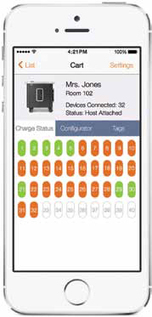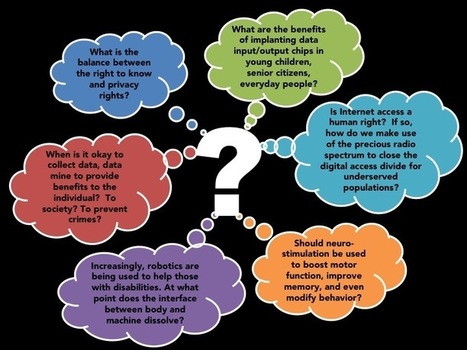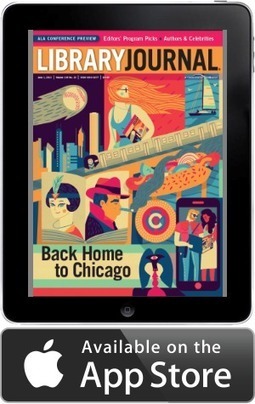 Your new post is loading...
 Your new post is loading...
IFLA has submitted a response to a call from the United Nations Special Rapporteur on Contemporary Forms of Racism concerning the impact of new technologies, sharing experience and highlighting the need to respect the key library value of equal access to education.
My phone is not a tool I use, it’s a facet of my ‘self’. It is part of who I am - part of what makes me human. By extension, the knowledge and expertise in my network is also interwoven into my sense of self, it’s an element of my identity. In this talk I will explore notions of the technoself and how we can respond to students and staff who embody, rather then simply use, technology. I will highlight what this means for critical pedagogy and the crucial role libraries play in fostering a culture of criticality within which students can extend, not defend, their identities.
(2015). Critical connections: personal learning environments and information literacy. Research in Learning Technology: Vol. 23, No. 1, 21193. doi: 10.3402/rlt.v23.21193 Personal learning environments (PLEs) and critical information literacies (CILs) are two concepts that have been presented as responses to the challenges of the rich and complex information landscape. While both approaches support learners’ critical engagement with new information environments, each was developed within a different field. This paper connects and contrasts PLEs and CILs in order to explore the design of pedagogical responses to the information environment. Through a careful examination of PLE and CIL literature, the paper demonstrates that information literacy education intersects with the concepts and goals of PLEs. As such, the authors suggest that PLE scholarship informed by CIL scholarship, and vice versa, will yield a deeper understanding of modern learning contexts as well as a more holistic and responsive learner framework. The example of the research assignment will be used to demonstrate the viability of this approach. With these propositions, the authors invite educators, librarians and information technologists to engage in a dialogue about these concepts and the potential for pedagogical change.
After we have reviewed a number of important Google Scholar tips, today we are sharing with you this equally important functionality provided by Google Scholar called ‘Library’. Google Scholar library is the place where you get to store all of the articles and other reading materials you search for on Scholar. It allows you to organize your saved content by topic and labels.
Evaluating Apps for the Classroom is an excellent free short interactive eBook (15 pages) created by Apple Education to be read on iBooks. As its title indicate, this guide is meant to help teachers make informed decisions about educational apps to integrate in their classroom instruction. Sifting through tons of educational apps in the App Store can be a daunting task especially for teachers whose schedules are already full enough to allow for such an endeavour.
SSGs remit is to help UCISA members get the most from information, technology enhanced learning, and computer mediated communication systems. Seeking out innovation – horizon scanning and identifying hot topicsRunning events – annual conference, workshops, webinarsDeveloping resources – case studies, good practice guides, toolkitsMonitoring practice – surveys, identifying trends, benchmarkingConnecting people – both physically and virtually, to support each other, share experience and best practiceEnabling the interface between central and distributed IT staff through empowering consultation and engagement with distributed IT staffContributing to UCISA policy development
Key Findings See the 2013 report for a full list of key messages, findings, and supporting data. Students recognize the value of technology but still need guidance when it comes to better using it for academics. Students prefer blended learning environments while beginning to experiment with MOOCs. Students are ready to use their mobile devices more for academics, and they look to institutions and instructors for opportunities and encouragement to do so. Students value their privacy, and using technology to connect with them has its limits.
Information Technology (IT) is getting more pervasive and complicated every day. Although most of us experience IT in terms of personal computing devices (smartphones, tablets, or laptops), office productivity tools (word processors or spreadsheets), or infrastructure functionality (routers and servers), IT is steadily becoming more sophisticated and critical to everything we do.
The ultimate guide to technology and higher education.
|
- This would include admissions, record keeping, billing, housing, report generation, compliance, food service, athletic administration, human resources, business office, payroll, information technology (IT), fundraising, facilities management and many others.(More…)
- Effective use of technology in these areas holds untold potential to transform higher education by introducing significant efficiencies and dramatic cost reductions in serving students.(More…)
- Kennesaw State University serves more than 33,000 students each year and offers more than 70 distance learning programs, including an online bachelor’s of science in information technology.(More…)
- Society for Information Technology & Teacher Education (SITE) “The Society for Information Technology and Teacher Education is an international association of individual teacher educators, and affiliated organizations of teacher educators in all disciplines, who are interested in the creation and dissemination of knowledge about the use of information technology in teacher education and faculty/staff development.”(More…)
- University College offers an online Bachelor of Arts in Information Technology degree completion program designed for students who need to finish earning their degree in the field.(More…)
Learning Spaces focuses on how learner expectations influence such spaces, the principles and activities that facilitate learning, and the role of technology from the perspective of those who create learning environments: faculty, learning technologists, librarians, and administrators. Information technology has brought unique capabilities to learning spaces, whether stimulating greater interaction through the use of collaborative tools, videoconferencing with international experts, or opening virtual worlds for exploration.
Via Nik Peachey
Information and communication technology has revolutionised virtually every aspect of our life and work.
Students unable to navigate through a complex digital landscape will no longer be able to participate fully in the economic, social and cultural life around them.
I have been asked in the past to provide key questions that a district and teachers could use to vet a website. While all websites designated for class use should be previewed by the teacher, it is especially important that Web 2.0 sites go through a vetting process. While everyone may have a different definition of Web 2.0, I promote the idea that a Web 2.0 site is a site that allows for interactivity. In this interactivity, a user may be able communicate and interact with others, leave a digital footprint, store digital information, and be open to various outside sources. For this reason it is important to vet a Web 2.0 site before providing access to students.
With a new ICT curriculum ready for England, and other countries exploring their ICT curriculum, a really useful assessment/progression resource has been produced by Computing at School. The purpose of the Progression Pathways Assessment Framework is to support teachers in assessing their pupils’ progress in computing from Age 5 (Year 1 in England) through to pupils in secondary school, aged 14 (Year 9).
Ethical decision-making should be included as a 21st century skill (overused term but don't know of an alternative). Some would profess that ethical decision-making has always been a needed skill....
The 2013 report was released earlier today by ECAR (EDUCAUSE Center for Analysis and Research). ECAR has been releasing this report annually since 2004. Direct to Full Text Report (49 pages; PDF) Direct to Infographic (PDF) From the Report’s Web Page: In 2013, ECAR collaborated with more than 250 higher education institutions to collect responses from more than 112,000 undergraduate students about their technology experiences and expectations. The findings are distilled into four broad themes to help educators and higher education institutions better understand how students experience technology on their respective campuses and the ways in which new, better, or more technology can impact students’ relationship with information technology.
NCAT is an independent non-profit organization dedicated to the effective use of information technology to improve student learning outcomes and reduce the cost of higher education. NCAT provides expertise and support to institutions and organizations seeking proven methods for providing more students with the education they need to prosper in today’s economy. Learn more...
|
 Your new post is loading...
Your new post is loading...
 Your new post is loading...
Your new post is loading...





